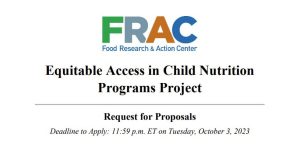Blog
FRAC Research Funding Opportunity
FRAC has announced a Request for Proposal (RFP) for subgrants for its Equitable Access in Child Nutrition Programs project, supported by funding through a cooperative agreement with the U.S. Department of Agriculture Food and Nutrition Service (USDA FNS). Submit your CACFP proposal by October 3, 2023, at 11:59pm ET.
Read MoreMeal Pattern Minute: Minimum Serving of Dried Fruits
If dried fruits credit for twice the volume of the fruit component, does that mean that the minimum serving is 1 tablespoon instead of 2 tablespoons?
Read MoreChild Care Supports Academic Achievement and Physical Health
A study published in March of 2023, examines the impact of child care on the dietary quality of young children, as well as portrays the need for a more inclusive definition of ‘child care.’ Access to high-quality care supports the academic and social development of your children and is important for all families to reduce socioeconomic disparities.
Read MoreWhat Foods are Creditable in the Infant Meal Pattern?
Whether you are new or seasoned in operating the Child and Adult Care Food Program, knowing what foods are creditable to serve within the CACFP meal pattern is crucial! If you are serving both infants and children, the meal patterns are not the same.
Read MoreMeal Pattern Minute: Veggie Straws
Veggie straws are made using vegetables, but do they credit in the CACFP?
Read MoreWe’re Expanding Our Spanish-Language Resources!
The Child and Adult Care Food Program community asked for more Spanish resources to be available on the National CACFP Sponsors Association website and we heard you! Available now in Spanish are more resources to help sponsors and providers with meal pattern requirements, best practices, and so much more!
Read MoreSummer EBT Eligibility, Certification, and Verification
USDA released a memo (SEBT 03-2023) to provide information to assist states in preparing to implement summer EBT in 2024. The memo explains how to identify, certify, and verify eligible children.
Read MoreMeal Pattern Minute: One Year of Tips
Let’s reflect on 52 episodes of our Meal Pattern Minutes.
Read MoreMeal Pattern Minute: Sodium Limits
There are sugar limits for breakfast cereals and yogurt. Do any foods have sodium limits?
Read MoreMeal Pattern Minute: Serving Juice and Milk
Full-strength juice can be served once per day in place of the fruit component, but can juice be served with milk for snack?
Read More









